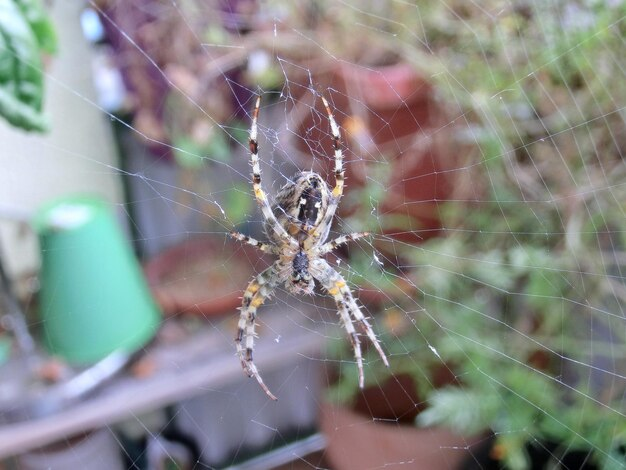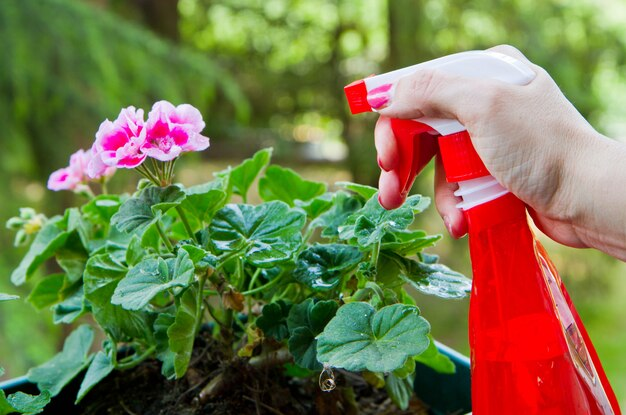Spiders are a familiar sight in many gardens, and while they contribute to a healthy ecosystem, too many can lead to the question: how to keep spiders away from the outside of the house? Today, we’ll explore various natural methods to deter these eight-legged guests from populating your outdoor plants and discuss how to prevent them from moving into areas like your porch.
Understanding Your Eight-Legged Garden Dwellers
Identifying and understanding the spiders in your garden is the first step toward managing their presence. Most spiders act as natural pest control, but if you find yourself concerned about how to stop spiders from getting in your house, it becomes important to know which spiders you’re dealing with and how to interact with them effectively.
Identifying Common Spiders in the Garden
From orb-weavers crafting intricate webs to the swift jumping spiders, familiarizing yourself with these common guests can help you take targeted actions. For those pondering how to keep spiders from making webs on your porch, here’s a list of garden spiders to watch for:
- Orb-Weaver Spiders – Their wheel-shaped webs are often a giveaway if you’re looking to prevent nests on your porch.
- Jumping Spiders – Although they don’t create webs, they’re active hunters and may wander onto your porch in pursuit of prey.
- Wolf Spiders – They’re ground-dwellers and less likely to be the culprits of webs on your porch, but their presence can indicate a healthy, pest-free garden.
The Role of Spiders in the Ecosystem
When considering what can I use to keep spiders out of my house, remember their ecological role. They are a crucial part of the outdoor environment, managing the population of insects that could otherwise become a nuisance.

Preventative Measures to Discourage Spiders
Maintaining a garden porch that’s unattractive to spiders may reduce the need to address how to remove spider webs from home permanently. Let’s delve into preventative steps you can take to minimize their appeal:
Keeping Your Garden Clean and Tidy
A well-maintained garden and porch are less enticing to spiders looking for hiding spots or corners to build their webs. To keep your outdoor spaces clean:
- Trim overhanging branches and vines that may lead spiders to your porch.
- Remove any accumulated debris where spiders may nest or seek shelter.
- Use strategic lighting since some insects (and thus spiders) are attracted to bright porch lights at night.
Selecting the Right Plants to Repel Spiders
For those seeking how to keep spiders away from the outside of the house, consider planting natural spider repellents. Plants with strong fragrances, such as lavender and peppermint, can deter spiders from taking up residence on your plants—and on your porch.
Natural Remedies for Spider Control
Natural pesticides and home remedies can be an effective response to how to stop spiders from getting in your house without relying on harsh chemicals that could harm your garden’s ecosystem.
DIY Sprays and Solutions
The use of non-toxic, homemade sprays might be your answer for a safe and natural way to remove spider webs and deter arachnids. Here is a simple table for crafting such solutions:
| Ingredient | Purpose | Example Mixture |
|---|---|---|
| White vinegar | Deters spiders with its acidity | 1 part vinegar to 2 parts water |
| Essential oils (e.g., peppermint, tea tree) | Repels spiders with strong scents | 10-15 drops of oil per cup of water |
| Dish soap | Helps remove webs and prevents spiders | A few drops in a water-filled spray bottle to clean areas where webs recur |
Beneficial Insects: Allies in the Garden
As you consider how to keep spiders from making webs on your porch, don’t overlook beneficial insects. Allies like praying mantises can help curb the spider population by consuming both the spiders and the insects that attract them. This natural method of pest control not only helps reduce spiders but also contributes to the overall health of your garden.
By incorporating these natural methods into your gardening routine, you can create a space that is less appealing to spiders while also addressing concerns about how to remove spider webs from home permanently. Stay tuned for the continuation of our guide, where we’ll explore additional tactics for maintaining a spider-free environment around your home and garden.

Physical Removal of Spiders
When natural deterrents and preventative measures aren’t enough, physical removal of spiders can be executed with care. This method ensures that you’re directly tackling the issue without causing harm to the beneficial spiders or the environment.
Safe Handling and Relocation Techniques
For those wondering how to keep spiders from making webs on your porch, physical removal can be as simple as using a soft brush or broom to gently sweep away the webs, ensuring that you relocate any spiders you encounter to a more suitable habitat, like a distant plant or a shed. Here are steps to safely relocate spiders:
- Wear gloves to protect your hands and reduce direct contact with the spiders.
- Use a jar or container to carefully capture the spider without harming it and cover it with a lid.
- Transport the spider to a location far from your house, where it can continue to contribute to pest control.
Creating Barriers for Spider-Proofing Plants
To prevent spiders from returning to your plants, consider creating physical barriers. These can be made from natural materials that discourage spiders from crossing or settling in. Options include:
- Diatomaceous earth: A powder made from fossilized algae that is abrasive to spiders.
- Cedar mulch: Not only a garden aesthetic but also a natural spider repellent due to its strong scent.
By taking these physical measures, you ensure that both your personal comfort and the spider population are managed effectively.
Maintaining a Spider-Free Outdoor Space
Consistency is key when it comes to keeping spiders at bay. A regular maintenance routine helps uphold the defenses you’ve built against them.
Regular Monitoring and Maintenance
Regular check-ups on your garden and porch area are vital to spot any new webs or spider activity early. Monitoring helps you stay on top of any potential infestations and apply your natural solutions promptly. Here’s a simple maintenance checklist:
- Weekly inspection of plants, under leaves, and around the perimeter of your house for any signs of spider activity.
- Quick response with natural deterrents or physical removal whenever spider webs or spiders are detected.
Seasonal Tips for Long-Term Spider Management
As the seasons change, so do the habits of spiders. They may seek shelter during colder months leading to an increased need for vigilance on how to stop spiders from getting in your house. Here’s what you can do to adapt:
- In the spring, clear out any overwintering spiders from your garden shed or house corners.
- Prior to autumn, reinforce your barriers and deterrents to prevent spiders from seeking indoor shelter.
With the right approach and regular practices, maintaining a spider-free outdoor space is achievable, setting the foundation for a beautiful and relaxing garden environment.

Conclusion: Embracing Natural Pest Control Methods
In conclusion, managing spider populations in your garden and minimizing their intrusion into your home can be effectively handled through natural, non-harmful methods. By understanding spider behavior and opting for practices that align with the ecosystem, you can keep your outdoor plants – and home – free from unwanted arachnid guests, all while fostering a healthy and balanced garden.
FAQ: Common Questions About Spider Control in Gardens
Can spiders damage my outdoor plants?
Generally, spiders are not harmful to plants. They do not feed on plants but instead prey on insects that might. However, in excessive numbers, their webs can occasionally make plants look untidy.
Are there any spiders I should not remove from my garden?
It is usually wise to leave non-venomous, beneficial spiders, like orb-weavers and jumping spiders, since they help control pest populations. Always research the types of spiders common to your area and consult local guidelines.
How often should I apply natural spider repellents?
The frequency can vary depending on conditions, but generally, you should reapply natural repellents like essential oil sprays every few days or after rainfall.
Does weather affect the effectiveness of natural spider remedies?
Yes, rain can wash away natural remedies, and colder weather can send spiders seeking shelter. It’s important to reapply deterrents after weather events and adjust your strategies seasonally.
What should I do if natural remedies don’t work?
If natural solutions aren’t sufficient, you might need to consult a pest control professional to assess the situation. They can offer advice and services tailored to your specific needs without compromising the health of your garden.
